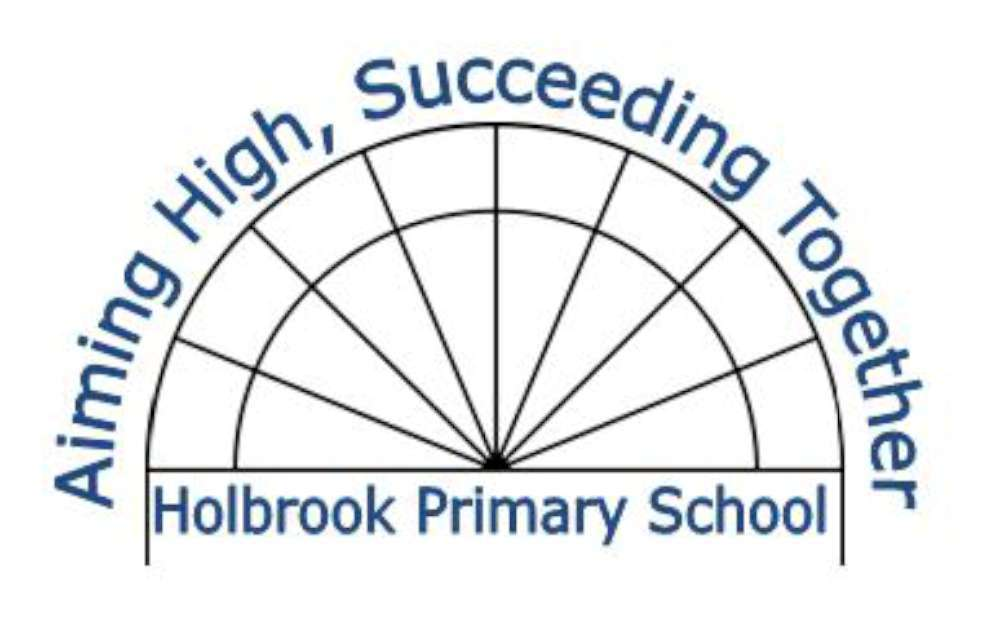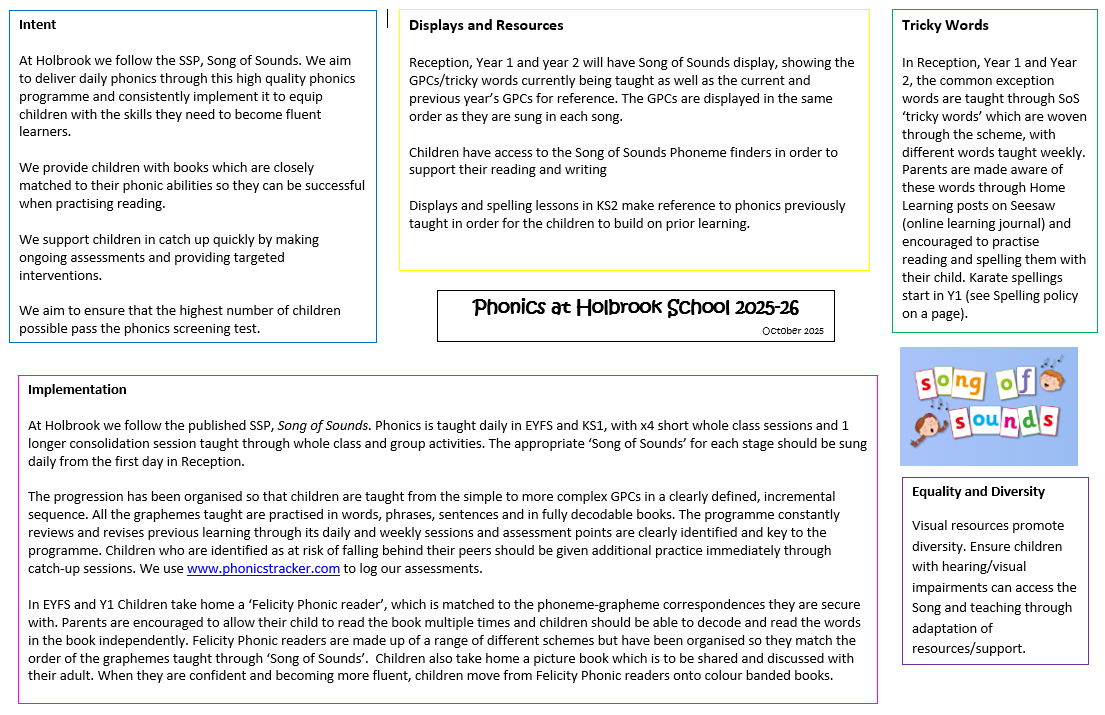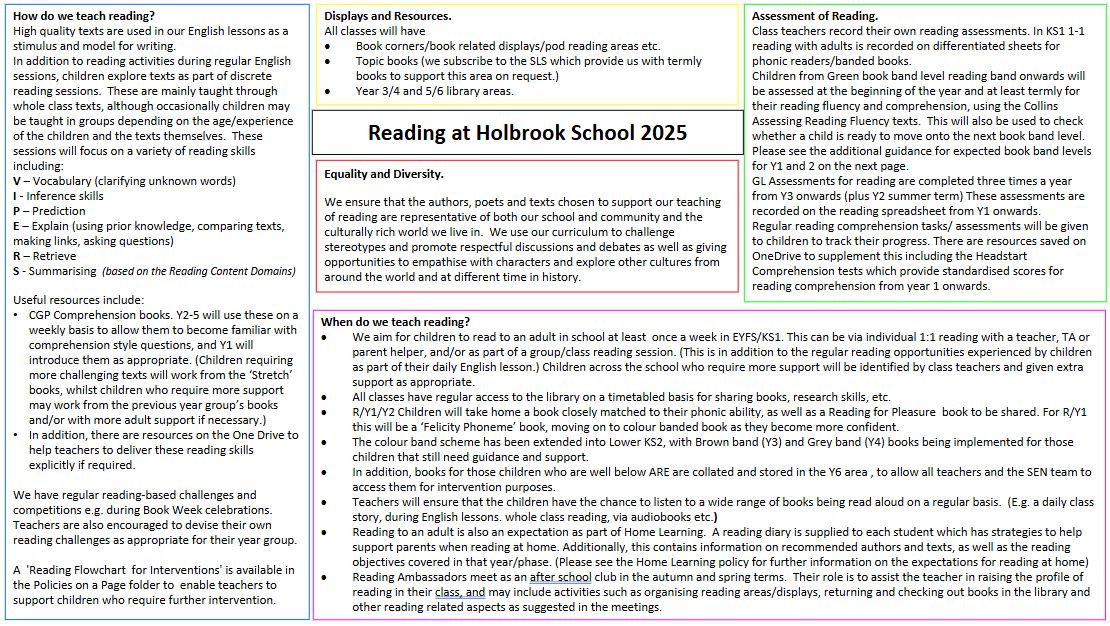English – Phonics and Reading
Reading at Holbrook
INTENT
At Holbrook Primary School we believe that reading is the core skill to everything that children do. It is integral to our school curriculum and a fundamental life skill that impacts on the acquisition of knowledge. We aim to provide children with a life-long love of reading and provide them with the skills to be able to:
- Apply a knowledge of structured synthetic phonics in order to decode unfamiliar words with increasing accuracy and speed;
- Read accurately, fluently and with understanding
- Be able to read with expression, clarity and confidence;
- Develop a good linguistic knowledge of vocabulary and grammar;
- Read and respond to a wide range of different types of texts;
- Develop a deeper level of emotional intelligence and empathy
- Read fluently, and with confidence, in any subject in their forthcoming secondary education
PHONICS IMPLEMENTATION
EYFS and KS1 use ‘Song of Sounds’, a well sequenced, multi-sensory, DfE validated synthetic phonics scheme. There is a clear progression of graphemes taught and the song and actions support learners. Phonics is taught daily in EYFS and KS1, with x4 short whole class sessions and 1 longer consolidation session taught through whole class and group activities. The appropriate ‘Song of Sounds’ for each stage is sung daily from the first day in Reception.
All the graphemes taught are practised in words, phrases, sentences and in fully decodable books. We constantly review and revise previous learning through our daily and weekly sessions.
Phonic knowledge and application is assessed regularly which means children who fall behind are supported to catch up quickly. Children take home decodable readers matched to their phonic ability, in order to support their phonics development and ability, along with a book of their own choice to share with an adult. Once children become fluent readers, they move to reading a range of books including colour banded books to support them to read at a stage-appropriate level.
All pupils have opportunities to develop their reading skills daily, and are encouraged to read at home with an adult. Children have reading diaries in which to share their home reading and responses to texts.
All staff, across all year groups, are trained and taught to be experts in early reading. We also offer parent workshops for EYFS and KS1 which ensure parents and carers have the opportunity to have a greater understanding of how and why we teach phonics at Holbrook. The ‘Song of Sounds’ resources continue to be referenced throughout KS2 in order to support the children’s reading and spelling work.
PHONICS IMPACT
The children enjoy their phonics lessons and through their reading and writing, it is evident that they are able to apply and implement their phonic knowledge and skills. Children read their decodable books with confidence as they are well matched to their needs. Our KS1 phonics screening results are above the national average by the end of Y2. As a result of our phonics teaching, children are able to decode unfamiliar words with increasing accuracy and speed which then supports them in becoming confident, fluent and independent readers.
READING IMPLEMENTATION
Children are exposed to a wide range of quality texts through reading and writing lessons and reading for pleasure. Our literature spine is reviewed regularly and we ensure that the authors, poets and texts chosen to support our teaching of reading are representative of both our school community and the culturally rich world we live in.
Children explore texts as part of regular reading lessons. These are generally taught in whole class shared reading sessions which are used throughout the school to enable all children to share high quality texts and develop skills in reading comprehension based on the VIPERS skills. (Vocabulary, Inference, Predictions, Explanation, Retrieval, Summarise and Sequence). As children develop their reading, we continue to focus on speed, accuracy and fluency, which is assessed regularly to identify any children who require intervention or support.
Reading for pleasure is encouraged and modelled. Staff share books through story time sessions in addition to books studied as part of whole class reading sessions. Two reading ambassadors per class are voted in by their peers in Y2-6. These children assist the teacher in raising the profile of reading in their class. Reading initiatives and whole school events to encourage engagement with books take place (e.g. WBD, book fairs, Rainbow Reader challenge) We have a well-stocked library which children access regularly with their teachers.
Reading to an adult is an expectation of home learning. A reading diary is supplied to each student which has strategies to support parents when reading at home. Parents/carers and children are expected to record reading and responses to texts.
READING IMPACT
Children use their reading skills in other subjects. They read for meaning and for pleasure. Staff enthusiastically share texts with their classes and are constantly reviewing new and existing resources. Children are well equipped to transition to their next stage of learning.
A high number of children achieve the expected standard or higher and those who find reading challenging are supported to catch up.


Phonics Information Presentations
Useful websites
-
Reading websites
A collection of useful reading websites
-
Books for topics
Signposts to recommended books for children
-
Top tips for reading at home
Support reading at home
-
Reader Teacher
Signposts to recommended books for children


